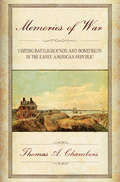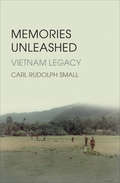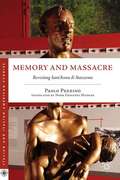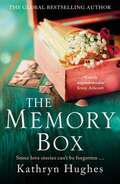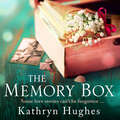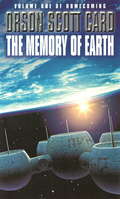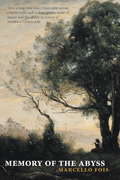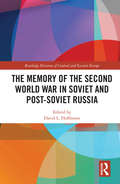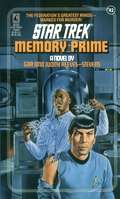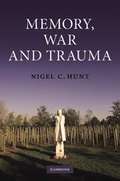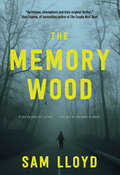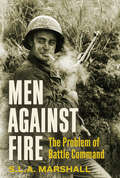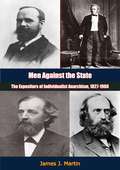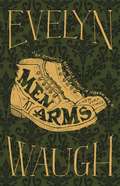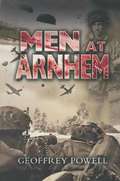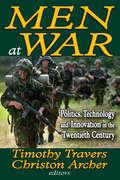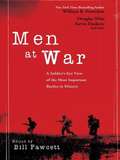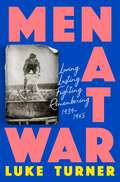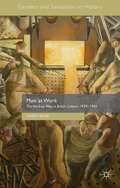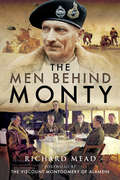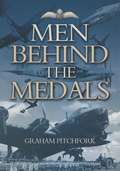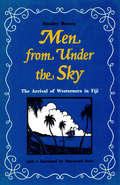- Table View
- List View
Memories of War: Visiting Battlegrounds and Bonefields in the Early American Republic
by Thomas A. ChambersEven in the midst of the Civil War, its battlefields were being dedicated as hallowed ground. Today, those sites are among the most visited places in the United States. In contrast, the battlegrounds of the Revolutionary War had seemingly been forgotten in the aftermath of the conflict in which the nation forged its independence. Decades after the signing of the Constitution, the battlefields of Yorktown, Saratoga, Fort Moultrie, Ticonderoga, Guilford Courthouse, Kings Mountain, and Cowpens, among others, were unmarked except for crumbling forts and overgrown ramparts. Not until the late 1820s did Americans begin to recognize the importance of these places. In Memories of War, Thomas A. Chambers recounts America's rediscovery of its early national history through the rise of battlefield tourism in the first half of the nineteenth century. Travelers in this period, Chambers finds, wanted more than recitations of regimental movements when they visited battlefields; they desired experiences that evoked strong emotions and leant meaning to the bleached bones and decaying fortifications of a past age. Chambers traces this impulse through efforts to commemorate Braddock's Field and Ticonderoga, the cultivated landscapes masking the violent past of the Hudson River valley, the overgrown ramparts of Southern war sites, and the scenic vistas at War of 1812 battlefields along the Niagara River. Describing a progression from neglect to the Romantic embrace of the landscape and then to ritualized remembrance, Chambers brings his narrative up to the beginning of the Civil War, during and after which the memorialization of such sites became routine, assuming significant political and cultural power in the American imagination.
Memories Unleashed: Vietnam Legacy
by Carl Rudolph SmallAfter forty years of silence, a Vietnam veteran shares powerful personal memories of his year of combat. This memoir of the Vietnam War is structured as a series of short vignettes that convey the emotional and physical landscape of the Vietnam War. It is a window into the war from the perspective of “the marine”—the author, who served in a rapid response assault force. Carl Rudolph Small joined the Corps in 1969 at nineteen years old, coming from a small Vermont farming community. After boot camp and specialty training he landed in Da Nang as a private first class. With three battlefield promotions in eight months, he soon became a platoon sergeant. Small did not talk of his experiences in Vietnam over the next forty years—but now, he has written this book so that veterans’ families, including his own, can better understand what their loved ones experienced. It brings you inside the mind of the marine; you see what he sees, feel what he feels. You know him and where he comes from, what he is thinking, why he makes the decisions he needs to make.Memories Unleashed is an assemblage of memories, consisting of stories that stand alone to create a whole greater than the sum of its parts. It addresses the warrior, the lives of innocent people caught up in the war, and the American and Vietnamese families impacted by those who fought. “A fierce focused account of one man’s year in the kind of close combat that was hard to talk about and hard to forget.” —Tom Powers
Memory and Massacre
by Paolo PezzinoThis book recounts the massacre at Sant'Anna di Stazzema and examines its after effects. During the Nazi occupation of Italy, SS officers were charged with destroying anti-Fascist and anti-Nazi partisans. Paolo Pezzino not only reconstructs the events, but deals with the "forgetting" of the massacre.
The Memory Box: A beautiful, timeless and heartrending story of love in a time of war
by Kathryn HughesSome love stories can't be forgotten...A heartbreakingly beautiful novel, The Memory Box unlocks an unforgettable epic story of love and war, from the million-copy-selling author of The Letter, Kathryn Hughes. If you adored The Nightingale, The Tuscan Contessa or My Name is Eva, this is the book for you. 'I could not put this book down! It is absolutely phenomenal from the very first page right until the very last page. It is heartbreaking, joyful, hopeful, and a book that you won't want to put down*****'Jenny Tanner opens the box she has cherished for decades. Contained within are her most precious mementoes, amongst them a pebble, a carving and a newspaper cutting she can hardly bear to read. But Jenny knows the time is finally here. After the war, in a mountainside village in Italy, she left behind a piece of her heart. However painful, she must return to Cinque Alberi. And lay the past to rest.After a troubled upbringing, Candice Barnes dreams of a future with the love of her life - but is he the man she believes him to be? When Candice is given the opportunity to travel to Italy with Jenny, she is unaware the trip will open her eyes to the truth she's been too afraid to face. Could a place of goodbyes help her make a brave new beginning?Will you be the next reader to lose your heart to The Memory Box?'Wow, wow, wow!!! A gorgeous story which had me hooked. The best book I have read all year. Make sure you have a box of tissues when you read this heartwarming beautiful story *****''I love WW2 fiction and The Memory Box didn't disappoint. It's an emotive, thought-provoking read about love, loss and forgiveness''I absolutely loved this book. Devoured it in a few days. I eagerly await more of Kathryn Hughes' books. I will be first in line. Excellent *****''What a gorgeously written tale. This story was heartbreaking but also heartwarming. Full of unexpected twists, this one had me gripped! *****''A stunningly beautiful story. Brilliantly developed characters and the usual amount of research that Hughes puts in all her works. A heart-warming and emotional read that I read in one sitting *****' 'I absolutely adored this book! I enjoyed the characters and the story! The story had me finishing the book in no time! I highly recommend this book!!! A story that will stay with me a while' 'An extremely well researched story, beautifully told. It is sad in places, but heart-warming in others''A heartwarming, well-written story. Heartbreaking in places but a story that had to be told *****''I could not put this one down. I loved the story and the author. A wonderful read!'
The Memory Box: An absolutely heartbreaking WW2 novel about love against the odds, based on a true story
by Kathryn HughesA heartbreakingly beautiful novel, The Memory Box unlocks an unforgettable epic story of love and war, from the million-copy-selling author of The Letter, Kathryn Hughes. If you adored The Nightingale, The Tuscan Contessa or My Name is Eva, this is the book for you. Some love stories can't be forgotten...Jenny Tanner opens the box she has cherished for decades. Contained within are her most precious mementoes, amongst them a pebble, a carving and a newspaper cutting she can hardly bear to read. But Jenny knows the time is finally here. After the war, in a mountainside village in Italy, she left behind a piece of her heart. However painful, she must return to Cinque Alberi. And lay the past to rest.After a troubled upbringing, Candice Barnes dreams of a future with the love of her life - but is he the man she believes him to be? When Candice is given the opportunity to travel to Italy with Jenny, she is unaware the trip will open her eyes to the truth she's been too afraid to face. Could a place of goodbyes help her make a brave new beginning?(P)2021 Headline Publishing Group Limited
The Memory Of Earth: Homecoming Series: Book 1 (Homecoming #1)
by Orson Scott CardHaunting, compulsive, urgently readable...Storytelling genius - INTERZONECertain to be one of the most soughtafter books of the year - LOCUSThe planet called Harmony had been settled by humans nearly forty years before. The colony had been placed under the care of an artificial intelligence, the Oversoul, high in orbit. This master computer had one overriding command: guard the people of Harmony.But now the Oversoul is itself in danger. Soon, within a thousand years, catastrophic war will break out on Harmony unless the Oversoul can be repaired. The master computer has determined that it must be taken back to lost Earth; someone on Harmony must be given back the knowledge of space travel in order to save the planet from destruction. For one family, about to be caught up in an approaching civil war, life will change for ever.The first book in the brilliant Homecoming series.Books by Orson Scott Card:Alvin Maker novelsSeventh SonRed ProphetPrentice AlvinAlvin JourneymanHeartfireThe Crystal CityEnder Wiggin SagaEnder's GameSpeaker for the DeadXenocideChildren of the MindEnder in ExileHomecomingThe Memory of the EarthThe Call of the EarthThe Ships of the EarthEarthfallEarthbornFirst Formic War (with Aaron Johnston)Earth UnawareEarth AfireEarth Awakens
A Memory of Solferino
by Henry DunantThe horrors witnessed by Dunant after the battle of Solferino on June 24 1859 and his humanitarian appeal are the origins of the Red Cross movement.
Memory of the Abyss
by Marcello FoisWhen Samuele Stocchino is two years old the village sage can already see a heart shaped like a wolf's head beating in his breast: the heart of a murderer. As a colonial soldier in Northern Africa, recruited from one subject land to subdue another, the sixteen-year-old Stocchino learns to kill before he has learned to love, and it is a skill he hones to perfection on the pitiless battlefields of the Corso Front in the Great War. Returning to Sardinia a hero to a pauper's welcome, he finds his family swindled and his sweetheart stolen away by the richest clan in the region, and from one first crime of passion a bitter feud is born. Stocchino terrorizes his wealthy neighbours and anyone who dares to till their land until, with Italy now firmly under Mussolini's boot, his elimination becomes Il Duce's priority. As he continues to elude capture, the seeds of myth are sown and the legend of Samuele Stocchino is forged. Shrouded by mystery and portent, Memory of the Abyss is a stirring fusion of myth, history and fiction, a daring re-imagining of the true story of a notorious Sardinian bandit and a deft excavation of the island's cultural roots by one of Italy's most gifted and celebrated writers.
The Memory of the Second World War in Soviet and Post-Soviet Russia (Routledge Histories of Central and Eastern Europe)
by David L. HoffmannThis volume showcases important new research on World War II memory, both in the Soviet Union and in Russia today. Through an examination of war remembrance in its various forms—official histories, school textbooks, museums, monuments, literature, films, and Victory Day parades—chapters illustrate how the heroic narrative of the war was established in Soviet times and how it continues to shape war memorialization under Putin. This war narrative resonates with the Russian population due to decades of Soviet commemoration, which continued virtually uninterrupted into the post-Soviet period. Major themes of the volume include the use of World War II memory for political legitimation and patriotic mobilization; the striking continuities between Soviet and post-Soviet commemorative practices; the place of Holocaust memorialization in contemporary Russia; Putin’s invocation of the war to bolster national pride and international prestige; and the relationship between individual memory and collective remembrance. Authored by an international group of distinguished specialists, this collection is ideal for scholars of Russia across a range of disciplines, including history, political science, sociology, and cultural studies.
Memory Prime (Star Trek: Vanguard #42)
by Judith Reeves-StevensMemory Prime It is the central core of an immense computer library -- an elite network of research planetoids. Here, the Pathfinders -- the only artificial intelligences legally permitted to serve the Federation -- control and sift the overwhelming dataflow from thousands of research vessels across the galaxy... Now the greatest scientists in the Federation have gathered here for the prestigious Nobel and Z-Magnees prize ceremonies -- unaware that a deadly assassin is stalking one of them. And as Captain Kirk struggles to save his ship from sabotage and his first officer from accusations of murder, he discovers the hidden assassin is far from the deadliest secret lurking on Memory Prime...
Memory, War and Trauma
by Nigel C. Hunt<p>Many millions of people are affected by the trauma of war. Psychologists have a good understanding of how experiences of war impact on memory but the significance of external environmental influences is often disregarded. Memory, War and Trauma focuses on our understanding of the psychosocial impact of war in its broadest sense. Nigel C. Hunt argues that, in order to understand war trauma, it is critical to develop an understanding not only of the individual perspective but also of how societal and cultural factors impact on the outcome of an individual's experience. <p>This is a compelling book which helps demonstrate why some people suffer from post-traumatic stress when other people don't, and how narrative understanding is important to the healing process. Its multi-disciplinary perspective will enable a deeper understanding of both individual traumatic stress and the structures of memory. </p>
The Memory Wood
by Sam LloydA heart-stopping, chilling thriller about an abducted girl, the boy who can save her and the terrifying cat-and-mouse game of deception and betrayal that they are playing."If you've only just arrived . . . then why do you want to leave?"Elissa arrived in Memory Wood on the most important day of her life. The thirteen-year-old chess prodigy was competing at the English Youth Grand Prix when she was snatched, and then woke up in a makeshift cell underground.Elijah has lived beside Memory Wood for as long as he can remember. He's only twelve but he's spent his life so far exploring every inch of it, and that's how he finds Elissa.When he appears in her cell, Elissa assumes Elijah will help her; that he'll go to the police and give them the answers they desperately need. But Elijah doesn't want her to leave. As her abductor's behaviour becomes increasingly erratic, Elijah's company is soon her only source of relief and Elissa realizes that this strange, lonely boy is her one hope for survival. Drawing on all her resilience and powers of logic to outwit him, their deadly game of cat and mouse, of deception and betrayal, but also their bond of friendship, will determine both their fates. . . .
Men Against Fire: The Problem of Battle Command in Future War
by S. L. A. MarshallThis book examines why only one in four men in battle seem to fire their guns, and offers means by which the number of active soldiers can be increased.
Men Against Fire: The Problem of Battle Command
by S.L.A. "Slam" MarshallMen Against Fire, first published in 1947 (and updated in 1961), is an in-depth analysis of military leadership and infantry tactics, with numerous recommendations to improve the effectiveness of ground troops in combat situations. The psychology of combat (e.g., chapters “Why Men Fight” and “Men Under Fire”) is also examined by Marshall, himself a veteran of World War I and a combat historian during World War II.S.L.A. "Slam" Marshall was a veteran of World War I and a combat historian during World War II. He startled the military and civilian world in 1947 by announcing that, in an average infantry company, no more than one in four soldiers actually fired their weapons while in contact with the enemy. His contention was based on interviews he conducted immediately after combat in both the European and Pacific theaters of World War II.
Men Against State: The Expositors of Individualist Anarchism, 1827-1908
by James J. Martin“...the starting point for anyone concerned with the antecedents of libertarianism in the United States...”MEN AGAINST THE STATE first appeared in the spring of 1953. Within a matter of months it had received nearly fifty highly commendatory reviews in thirteen countries in seven languages. Few products of American scholarly research in our time have gained more widespread international respect in such a short time.This book brought back into view a tradition which almost disappeared between the beginning of the First World War and the end of the Second, the philosophy and deeds of anti-statist libertarian voluntarism in the United States during the three generations which flourished between 1825 and 1910, in a style which a London commentator described as “a model of readable scholarship.”In the 1950s, the era of the “organization man” and almost unparalleled political passivity, MEN AGAINST THE STATE may have been a premature book, as some have observed, despite being reprinted two more times later in the decade. This quiet and unsensational circulation continued to further its reputation, nevertheless.In the last ten years however it has been recognized by many as the starting point for anyone concerned with the antecedents of libertarianism in the United States. The spread of interest in such thinking among a new generation has prompted the reissuance of this book, in a conventionally-printed popularly priced edition for the first time.
Men at Arms (Sword of Honour Trilogy #1)
by Evelyn WaughThe first volume of Evelyn Waugh's masterful trilogy about war, religion, and politics. The next two books are Officers and Gentlemen, and The End of the Battle.
Men at Arnhem
by Geoffrey PowellWhen Men at Arnhem was first published in 1976 the author modestly concealed his identity behind a pseudonym and changed the names of his comrades in arms. But the book was at once recognised as one of the finest evocations of an infantrymans war ever written and those in the know were quick to identify the author. His cover has long since been blown, in this edition Geoffrey Powell adds an introduction in which he identifies the men who fought with him in those eight terrible days at Arnhem in September, 1944. The book cannot be said to be a military history in the strictest sense, even the units involved being unidentified, but the events described are, as the author points out in his introduction, as nearly accurate as memory allowed after a lapse of over thirty years. It is unlikely every to be surpassed as the most vivid first-hand account of one of those epic disasters which we British, in our paradoxical way, seem to cherish above and beyond the most glorious victories.
Men at War: Politics, Technology, and Innovation in the Twentieth Century
by Christon ArcherThe growing number of books on military history and the lively interest in military history courses at colleges and universities show that the study of war is enjoying considerable popularity. The reasons for this are arguable, but of immediate interest is the kind of military history that is taught and written. Here the student of war comes across an interesting division of opinion as to how military history should be written. Military history, lying as it does on the frontier between history and military science, requires knowledge of both fields. This fact often presents a difficulty to the history teacher.Generally speaking, history is a discipline by virtue of its subject matter, not by virtue of a particular methodology such as is characteristic of the sciences and of some social sciences. The perspective of Men at War is a cross between a professional internalist approach and a civilian contextual view. This separation is not unique to military history, for the same dualism tends to occur in those areas of history, such as law and medicine, that can be written both by members of the profession concerned lawyers and doctors and by those outside the profession.The problem is that at one extreme the contextual view can take the emotional content out of war, while at the other extreme the internalist view can put too much in. Men at War seeks to locate a military history that combines the professional, internalist method and the civilian, contextual method by showing that these are two fundamental sources from which a war derives. Seen in this way, this volume breaks new ground in defining the sources of twentieth-century power.
Men at War
by Bill FawcettEpic battles?as seen through the eyes of the men who fought them. From Gettysburg to D-Day, history?s most momentous battles have been recounted to the world on a grand scale. This book, for the first time ever, looks at man?s most epic battles from the point of view of the soldiers on the front lines; providing new insight into the great wars of history. Stories told by the Roman Legionaire, the British Doughboy, and the American Doggie, delve into these battles and battlefronts: Roman Legion Third Crusade under Richard Lionheart Waterloo, French under Napoleon American Civil War: Gettysburg WWI: Americans at Ardennes WWII: Japanese Island Defense WWII: D-Day, Americans at Normandy Marines at Chosin.
Men at War: Loving, Lusting, Fighting, Remembering 1939-1945
by Luke TurnerAs a child, Luke Turner was obsessed with the Second World War. He spent hours watching Sunday war films, poring over stories of derring-do and relishing in birthday trips to air museums. Lying in bed beneath Airfix fighter planes suspended from his ceiling, he would think about the men that might sit in their cockpits, and whether he could ever be one of them. Now, as an adult who has come to terms with a masculine identity and sexuality that is often erased from dominant military narratives, he undertakes a refreshingly honest analysis of his fascination with the war. In Men at War, Turner looks beyond the increasingly retrogressive and jingoistic ideal of a Britain that never was to recognise men of war as creatures of love, fear, hope and desire. From writers, filmmakers, artists and ordinary men - including those in his own family - Turner assembles a broad cast of characters to bring the war to life. There are conscientious objectors, a bisexual Commando, a pacifist poet who flew for Bomber Command, a transgender RAF pilot, a soldier who suffered in Japanese POW camps and later in life became an LGBT+ activist, and those who simply did what they could just to survive and return home to a complicated peace. As the conflict moves beyond living memory and the last veterans leave us, we are in danger of missing the opportunity to gain a true understanding of this rich history. By exploring a wartime experience that embraces sex, lust and the body as much as tactics and weaponry, Turner argues that the only way we can really understand the Second World War is to get to grips with the complexity of the lives and identities of those who fought and endured it.
Men at War: Loving, Lusting, Fighting, Remembering 1939-1945
by Luke TurnerAs a child, Luke Turner was obsessed with the Second World War. He spent hours watching Sunday war films, poring over stories of derring-do and relishing in birthday trips to air museums. Lying in bed beneath Airfix fighter planes suspended from his ceiling, he would think about the men that might sit in their cockpits, and whether he could ever be one of them. Now, as an adult who has come to terms with a masculine identity and sexuality that is often erased from dominant military narratives, he undertakes a refreshingly honest analysis of his fascination with the war. In Men at War, Turner looks beyond the increasingly retrogressive and jingoistic ideal of a Britain that never was to recognise men of war as creatures of love, fear, hope and desire. From writers, filmmakers, artists and ordinary men - including those in his own family - Turner assembles a broad cast of characters to bring the war to life. There are conscientious objectors, a bisexual Commando, a pacifist poet who flew for Bomber Command, a transgender RAF pilot, a soldier who suffered in Japanese POW camps and later in life became an LGBT+ activist, and those who simply did what they could just to survive and return home to a complicated peace. As the conflict moves beyond living memory and the last veterans leave us, we are in danger of missing the opportunity to gain a true understanding of this rich history. By exploring a wartime experience that embraces sex, lust and the body as much as tactics and weaponry, Turner argues that the only way we can really understand the Second World War is to get to grips with the complexity of the lives and identities of those who fought and endured it.
Men at Work: The Working Man in British Culture, 1939-1945 (Genders and Sexualities in History)
by Linsey RobbMen at Work explores the cultural portrayal of four essential wartime occupations: agriculture, industry, firefighting and the mercantile marine. In analysing a broad spectrum of wartime media (most notably film, radio and visual culture) it establishes a clear hierarchy of masculine roles in British culture during the Second World War.
The Men Behind Monty
by Richard MeadThe Men Behind Monty examines the role played by the staff in the victorious campaigns of Field Marshal Viscount Montgomery, Britain's most successful field commander since the Duke of Wellington.When Monty took command of Eighth Army in August 1942, he inherited the staff of his predecessor. He retained all the key members and most of them stayed with him not only from El Alamein to Tunis, but also in Sicily and Italy. When he took command of 21st Army Group in January 1944, many accompanied him to take up the most prominent positions on the HQ staff and the majority remained until the German surrender in May 1945.This fascinating work focuses not only on the senior officers responsible for the various staff branches, and notably on Monty's outstanding Chief of Staff, Freddie de Guingand, but also on his personal staff, the ADCs and personal liaison officers.The book sheds light on the work of the staff generally, and on their direct contribution to Monty's decisions, his sometimes difficult and controversial relationships with his superiors and allies.
Men Behind the Medals: A New Selection
by Air Commodore Graham PitchforkThis book pays tribute to the quite remarkable bravery of those young men who risked, and all too often lost, their lives for their country during the war. The author, himself a distinguished Royal Air Force officer, has singled out twenty-one men to represent 'the many' to whom he dedicated the book; but he has chosen them with care to illustrate, as far as possible, the wide scope of the duties of the Royal Air Force in wartime.
Men from Under the Sky
by Stanley Brown Raymond BurrThe cannibal kings of Fiji are gone, but their spirit lives on. Cannibalism in Fiji and the gruesome "earth ovens" are gone; the kai vavalagi, "the men from over the horizon," changed that, bringing their own brands of justice tempered by the musket, disease, and dissoluteness.There were giants in those days, Fijians and Westerners alike. This gripping and unique history of Fiji by Stanley Brown, a well-known Fiji "old-timer" and historian, is woven around the lives of eleven Western "giants," Europeans and Americans who had the greatest impact on each epoch. Not all these Westerners lived to tell the tale.This stirring narrative is replete with hair-raising accounts of battles and brutality. One incident of supreme savagery was reported by Lockerby, a famous trader, who reported that more than three hundred fifty old men, women and children were butchered after a battle: "As the canoes sallied back tot he mainland coast in the evening, the reddening sky silhouetted the bodies of children hanging from the mastheads." The earth-ovens were well-fueled that evening. But time and the tides of civilization tame the savage beast, and today Fiji is busy developing its economy, but the old accounts and stories still ring true.
